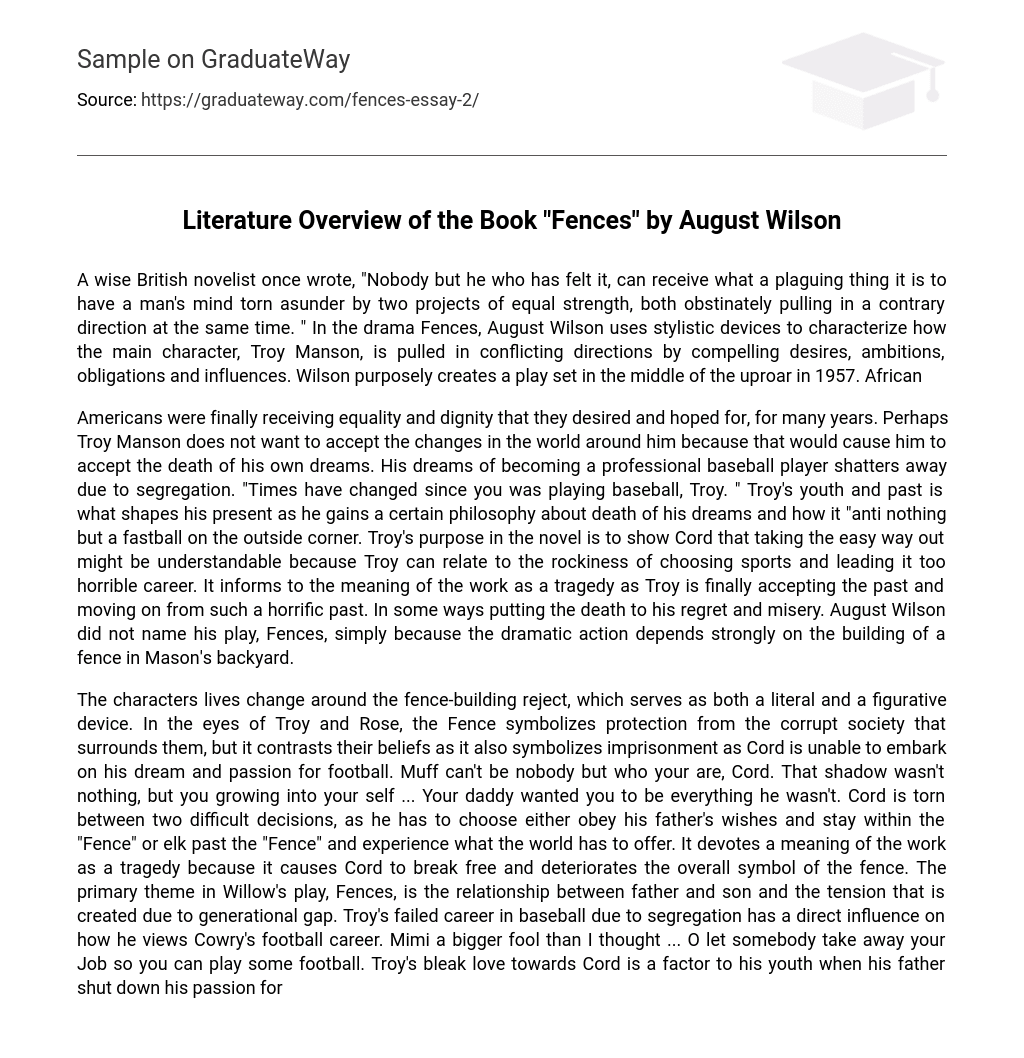A wise British novelist once wrote, “Nobody but he who has felt it, can receive what a plaguing thing it is to have a man’s mind torn asunder by two projects of equal strength, both obstinately pulling in a contrary direction at the same time. ” In the drama Fences, August Wilson uses stylistic devices to characterize how the main character, Troy Manson, is pulled in conflicting directions by compelling desires, ambitions, obligations and influences. Wilson purposely creates a play set in the middle of the uproar in 1957. African
Americans were finally receiving equality and dignity that they desired and hoped for, for many years. Perhaps Troy Manson does not want to accept the changes in the world around him because that would cause him to accept the death of his own dreams. His dreams of becoming a professional baseball player shatters away due to segregation. “Times have changed since you was playing baseball, Troy. ” Troy’s youth and past is what shapes his present as he gains a certain philosophy about death of his dreams and how it “anti nothing but a fastball on the outside corner. Troy’s purpose in the novel is to show Cord that taking the easy way out might be understandable because Troy can relate to the rockiness of choosing sports and leading it too horrible career. It informs to the meaning of the work as a tragedy as Troy is finally accepting the past and moving on from such a horrific past. In some ways putting the death to his regret and misery. August Wilson did not name his play, Fences, simply because the dramatic action depends strongly on the building of a fence in Mason’s backyard.
The characters lives change around the fence-building reject, which serves as both a literal and a figurative device. In the eyes of Troy and Rose, the Fence symbolizes protection from the corrupt society that surrounds them, but it contrasts their beliefs as it also symbolizes imprisonment as Cord is unable to embark on his dream and passion for football. Muff can’t be nobody but who your are, Cord. That shadow wasn’t nothing, but you growing into your self … Your daddy wanted you to be everything he wasn’t. Cord is torn between two difficult decisions, as he has to choose either obey his father’s wishes and stay within the “Fence” or elk past the “Fence” and experience what the world has to offer. It devotes a meaning of the work as a tragedy because it causes Cord to break free and deteriorates the overall symbol of the fence. The primary theme in Willow’s play, Fences, is the relationship between father and son and the tension that is created due to generational gap. Troy’s failed career in baseball due to segregation has a direct influence on how he views Cowry’s football career. Mimi a bigger fool than I thought … O let somebody take away your Job so you can play some football. Troy’s bleak love towards Cord is a factor to his youth when his father shut down his passion for baseball. “How come you anti never liked me? Liked you? Who the hell say I got to like you? ” Both Troy and Cord allow their own frustrations about life to derail their own dreams. For example when Troy tells Cord to choose a life of a stable career instead of pursuing his dreams, instead Cord becomes defiant and Joins the marines. Coors decision contributes to the meaning of the work as a tragedy as a special bond between father and son is broken.
Willow’s purpose of conflicting directions with such passion, desire and ambitions is to show readers that we control our own destiny in life. Corers desperate search for liberty, independence, and reasoning teaches us not to give up what makes us special and who we are and what were made to do in life. Corers experience as a teenager is similar to us human beings. We have much control on our future based on the decisions we make in the present. We often fail to reach our own fullest potential in life or realize our dreams if we lack a healthy and nurturing parental support.





